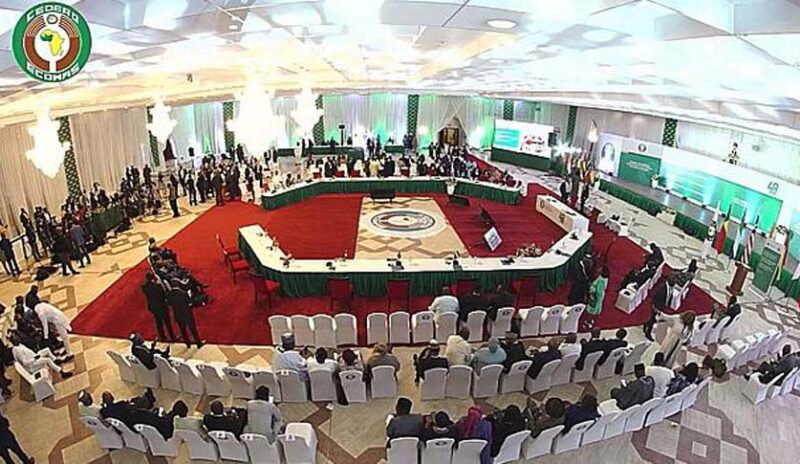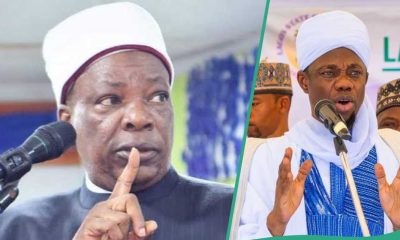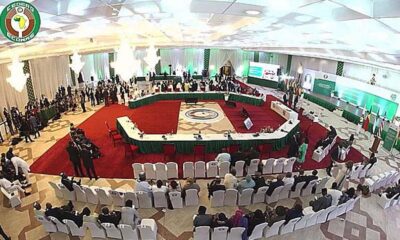Africa
Niger signs official defense pact with Mali, Burkina Faso – warns ECOWAS

Niger signs official defense pact with Mali, Burkina Faso – warns ECOWAS
The military leaders of Mali, Burkina Faso and Niger yesterday signed a mutual defence pact to counter the Economic Community of West African States (ECOWAS).
Making the announcement in Mali’s capital, Bamako, the ministerial delegations from the three Sahel countries under the security pact, the countries promise to come to the aid of each other in case of any rebellion or external aggression.
The Liptako-Gourma Charter establishes the Alliance of Sahel States, Mali’s junta leader, Assimi Goita posted on X, formerly known as Twitter.
Its aim is to “establish an architecture of collective defence and mutual assistance for the benefit of our populations”, he wrote.
The Liptako-Gourma region – where the Mali, Burkina Faso and Niger borders meet – has been ravaged by jihadism in recent years.
“This alliance will be a combination of military and economic efforts between the three countries”, Mali’s Defence Minister Abdoulaye Diop told journalists.“Our priority is the fight against terrorism in the three countries.”
A jihadist insurgency that erupted in northern Mali in 2012 spread to Niger and Burkina Faso in 2015.
All three countries have undergone coups since 2020, most recently Niger, where soldiers in July overthrew President Mohamed Bazoum.
READ ALSO:
-
My first marriage introduced me to poverty – Iyabo Ojo
-
3 Nigerian boxers qualify for Paris 2024 Olympic games
-
Akpabio’s aide dismisses reports of imminent NASS leadership change
The West African regional bloc ECOWAS has threatened to intervene militarily in Niger over the coup.
Mali and Burkina Faso quickly responded by saying that any such operation would be deemed a “declaration of war” against them.
The charter signed on Saturday binds the signatories to assist one another — including militarily — in the event of an attack on any one of them.
“Any attack on the sovereignty and territorial integrity of one or more contracting parties shall be considered as an aggression against the other parties and shall give rise to a duty of assistance… including the use of armed force to restore and ensure security”, it states.
It also binds the three countries to work to prevent or settle armed rebellions.
Mali has, in addition to fighting jihadists linked to Al Qaeda and the Islamic State group, seen a resumption of hostilities by predominantly Tuareg armed groups over the past week.
The escalation risks testing an already stretched army as well as the junta’s claims that it has successfully turned around a dire security situation.The secessionist groups had in 2012 launched a rebellion before signing a peace agreement with the state in 2015. But that accord is now generally considered moribund.
The renewed military activity by those armed groups has coincided with a series of deadly attacks attributed mainly to the Al-Qaeda-linked jihadist alliance Support Group for Islam and Muslims (GSIM).
Mali’s junta pushed out France’s anti-jihadist force in 2022 and the UN peacekeeping mission MINUSMA in 2023.
French troops have also been pushed out of Burkina Faso, while Niger’s coup leaders have renounced several military cooperation agreements with France.
Niger signs official defense pact with Mali, Burkina Faso – warns ECOWAS
Africa
Niger coup leader sworn in as president for five years

Niger coup leader sworn in as president for five years
Niger’s military ruler Gen Abdourahamane Tchiani has been sworn in as the country’s president for a transitional period of five years.
Tchiani has led the country since 2023, after he deposed Niger’s elected president, Mohamed Bazoum.
On Wednesday, Tchiani took the presidential office under a new charter that replaces the West African country’s constitution.
He was also promoted to the highest military rank of army general in the country and signed a decree ordering that all political parties be dissolved.
During the ceremony in Niamey, Tchiani said of his new military rank, “I receive this distinction with great humility… I will strive to live up to the trust placed in me.”
The transition to democratic government is consistent with the recommendations of a commission formed following national deliberations.
The new charter states that this five-year timeframe is “flexible” based on the country’s security position.
READ ALSO:
- AI will replace doctors, teachers, others in 10 years – Bill Gates
- Senate seeks FG’s immediate intervention to slash data prices
- Reno Omokri: Nigeria gives more opportunities than US, Britain, Canada
Niger has been plagued by Islamist attacks for years, which was one of the reasons junta officials staged their coup.
The military takeover came after a number of others in the region; adjacent Mali, Guinea, and Burkina Faso are also ruled by dictatorships.
All four countries have split ties with erstwhile colonial power France, forming new alliances with Russia.
And all save Guinea have pulled out of ECOWAS, the West African regional group.
Niger’s relations with ECOWAS broke down when the junta demanded a three-year transition period to democratic governance directly after the coup.
Ecowas labelled this plot a “provocation” and vowed to interfere with force before eventually backing down.
Gen Tchiani’s regime is prosecuting former President Bazoum on charges of high treason and damaging national security.
Bazoum and his wife remain in the presidential palace, despite the fact that his son was granted provisional freedom in January.
According to state-run news agency ANP, Gen Tchiani stated that Niger’s new charter adheres to traditional constitutions while also implementing “unprecedented measures to protect our natural resources so that Nigeriens truly benefit from the exploitation of their wealth.”
Niger coup leader sworn in as president for five years
Africa
Fuel hits N8,000/litre in Niger, country seeks help from Nigeria

Fuel hits N8,000/litre in Niger, country seeks help from Nigeria
With the fuel crisis bedevilling the Republic of Niger, some of its military officials have visited Abuja to seek support from Nigeria to tackle the shortage of Premium Motor Spirit in the country.
It was gathered that the delegation successfully got the approval for 300 trucks of fuel from the Nigerian government.
Trouble started for Niger -which has been reliant on a Chinese refinery – after the refinery was shut down due to some misunderstanding with the supplier.
This led to Niger turning to Nigeria for help to ameliorate the fuel shortage experienced by the country.
READ ALSO:
- Kano govt clarifies appeal court ruling on Sanusi’s reinstatement as emir
- NAF strikes kill notorious bandit kingpins, 20 others in Zamfara
- Chelsea beat Man City to win Women’s League Cup
Officials from the Nigerian government noted that the deal was approved with the hope of using it as a bargaining tool with Niger.
“We do not want to blow our trumpet. Rather, we want to use it as a bargaining chip for negotiation, as we continue to engage with them to bring them back to ECOWAS.
“Let them get more from us. I am confident that gradually they will come back to ECOWAS because they do not have enough resources to import food to sustain their citizens,” the official said while pleading anonymity.
Sources stated that fuel prices in Niger were hitting N8,000 per litre
However, some transborder businessmen have attributed the fuel scarcity in Niger to the lingering relationship between the country and Nigeria.
They noted that in some cross-border towns to Niger, fuel is being sold for between 1,200 CFA and N3,500 (N2,500 and N8,500).
Fuel hits N8,000/litre in Niger, country seeks help from Nigeria
Africa
ECOWAS activates standby force against insurgency

ECOWAS activates standby force against insurgency
The Economic Community of West African States (ECOWAS) has activated its Standby Force to curb terrorism and other transborder crimes in the subregion.
The Minister of Defence, Mohammed Badaru, who disclosed this in Abuja on Tuesday at the Forty-third ordinary meeting of ECOWAS Committee Chiefs of Defence Staff said the economic growth of the region is dependent on stable peace.
The minister added that there is a need for members of ECOWAS to close ranks against all forms of threats against the region.
On January 29, 2025, ECOWAS recognised the exit of three of its former members Burkina Faso, Mali, and Niger Republic upon the expiration of a one-year notice period.
READ ALSO:
- Supreme court dismisses appeal against Aiyedatiwa’s candidacy
- US set to present 30-day ceasefire offer to Russia
- BREAKING: House of Reps orders shutdown of porn websites nationwide
However, in “the spirit of regional solidarity”, ECOWAS asked its member countries to still recognise the national passports of the three exiting countries bearing the ECOWAS logo until further notice.
Their departure from the bloc has fractured the region and is leaving the ECOWAS grouping with an uncertain future.
The three junta-led countries formally notified ECOWAS of their plan for an “immediate” withdrawal in January 2024, citing the organisation’s excessive dependence on France in particular.
Paris has become the common enemy of the three juntas, which now favour partnerships with countries such as Russia, Turkey and Iran.
However, ECOWAS required one year’s notice for the departure to be effective — that deadline falls on January 29, 2025.
The three Sahelian countries have teamed up to form a separate confederation called the Alliance of Sahel States (AES).
ECOWAS activates standby force against insurgency
-

 metro3 days ago
metro3 days agoAttack on Mufty of Ilorin: Onikijipa Family Charges Stakeholders to Call Sheikh Habibullahi Al-Ilory to Order
-

 metro24 hours ago
metro24 hours agoRivers administrator Ibas fires Fubara’s political appointees
-

 metro23 hours ago
metro23 hours agoJUST-IN: Ex-Oyo gov Ajimobi’s first child Bisola dies At 42
-

 International2 days ago
International2 days agoCanada removes bonus ranking points for job offers in Express Entry system
-

 metro2 days ago
metro2 days agoHow ritualists, native doctor drugged, murdered underage sisters in PH – Police
-

 Sports2 days ago
Sports2 days agoNigeria’s Super Eagles falter in W’Cup qualifiers against Zimbabwe, S’Africa lead, Egypt, Morocco qualify
-

 metro23 hours ago
metro23 hours agoFG declares public holidays for Eid-el-Fitr
-

 Africa1 day ago
Africa1 day agoNiger coup leader sworn in as president for five years











